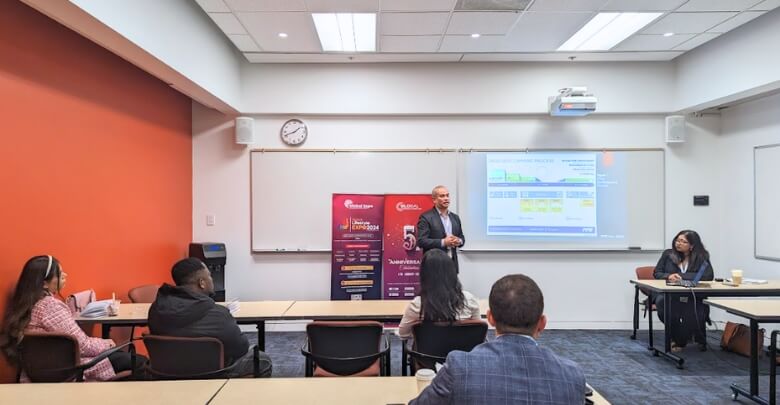Have you recently attended a business conference and wondered whether the expenses you incurred are tax deductible? As a business owner or employee, understanding the tax implications of attending conferences is essential. It helps make informed decisions about which events to attend and how to budget for them. For many professionals, the question arises, are business conference expenses tax deductible?
Determining if you can deduct these costs involves understanding specific IRS guidelines and ensuring your expenses meet certain conditions. This can be confusing, especially with the variety of expenses associated with attending conferences.
In this article, we’ll break down what qualifies for a deduction, how to maintain proper documentation, and what to watch out for to make sure you’re maximizing your potential tax benefits.
Cost of Attending A Business Conference
Attending a business conference provides valuable networking opportunities, learning, and growth. Especially if it is related to international business and marketing. However, there are various costs involved in attending a conference. They are as follows:
The cost of attending a business conference includes all expenses incurred while attending first-world countries like an American or Canadian business conference, such as registration fees, travel costs, accommodation, meals, and entertainment expenses. For instance, Canadian business conferences may have specific cost structures and regional considerations that affect your overall expenses.
When claiming expenses related to attending a business conference, use the actual cost or the standard rate method. The actual cost method involves adding up all the expenses you incurred, while the standard rate method uses a set amount per mile for travel expenses.
Transportation costs include expenses related to traveling to and from the business conference, such as airfare, rental car fees, gas, and parking. Convention costs involve expenses related to the actual conference, such as registration fees, booth rental, and advertising expenses.
Meals and entertainment costs include expenses related to meals and entertainment during the conference, such as meals with clients or colleagues and entertainment events. These expenses are subject to certain limitations and are only partially deductible.
Are Business Conference Expenses Tax Deductible?
Business conference expenses are generally tax-deductible if they are ordinary and necessary business expenses. A tax deduction is a reduction in taxable income that lowers taxes owed to the government for organizing a business conference successfully.

Deductible expenses are considered ordinary and necessary for conducting business and are deducted from the company’s taxable income. To be eligible for the tax deduction, the expenses must meet certain criteria set by the IRS. For business conference expenses to be deductible, the expenses must be directly related to the company’s trade or business and ordinary and necessary expenses.
The IRS allows deductions for registration fees, travel expenses (airfare, hotel, and transportation), and meal expenses for business conferences, seminars, and other similar events. However, the expenses must be reasonable and appropriate for the business purpose, and personal expenses, such as entertainment expenses, are generally not tax-deductible.
This raises the question, “Are Business Conference Expenses Tax Deductible?” and highlights the importance of understanding which costs qualify for deductions.
Keep accurate records of all expenses related to the business conference, including receipts, invoices, and other supporting documentation. It’s also advisable to consult with a tax professional to ensure all expenses are eligible for deduction and properly file tax returns.
Conditions for Deducting Business Conference Expenses
When it comes to deducting business conference expenses on your tax return, there are specific conditions that must be met to ensure the deduction is both valid and maximized. The IRS has clear guidelines on what qualifies as a business expense and what doesn’t, so it’s crucial to understand these rules to avoid any issues during tax season. Below are the main conditions that determine if your business conference expenses are deductible.
The Conference Must Be Business-Related
The most important condition is that the conference must be directly related to your business, profession, or trade. In simple terms, the event should have a clear purpose that contributes to your work. For example, attending a marketing conference as a business owner who needs to improve their marketing strategies would qualify.
However, attending a conference that is unrelated to your line of work—like a personal interest event—would not be deductible. It’s important to recognize the difference between a business meeting and a conference here. While a business meeting usually involves a smaller group with a specific agenda, a conference typically covers a broader range of topics and participants, which develops networking and learning opportunities. Both can be deductible if the business purpose is clear, but the scope of activities differs greatly.
Keeping Detailed Records
To claim any tax deduction, you need to maintain thorough documentation, and business conference expenses are no exception. Keep records of everything—registration fees, travel tickets, hotel invoices, meal receipts, and any other relevant expenses.
It’s essential to keep both the receipts and any additional proof that the conference was business-related, such as an event agenda or invitation. While it may seem tedious, these records will be invaluable if you’re ever audited by the IRS.
You should also note down the specific business purpose of each expense. For example, if you had a meal with a potential client during the conference, document who attended and the business topic discussed.
Travel Must Be Primarily for Business
If the conference requires travel, your travel expenses can only be deducted if the trip was primarily for business purposes. If you extend the trip to include personal vacation days, you must allocate the expenses accordingly.
The IRS requires that business activities dominate the trip for you to deduct the travel expenses. For instance, if the conference lasts four days and you stay two additional days for personal reasons, you can only deduct the expenses for the business-related portion of the trip, such as airfare, hotel stays, and meals during the conference.
Meals and Entertainment Deductions
Meals during the conference are usually deductible, but only at 50% of the actual cost. This applies to meals eaten alone or with business associates. Keep in mind, however, that extravagant meals are not deductible. The IRS allows deductions only for reasonable expenses that fit within standard business norms.
Entertainment expenses, such as tickets to sporting events or shows, are no longer deductible as of 2018. If you attend a social or entertainment event during the conference, be aware that these costs cannot be deducted unless directly tied to your business purpose.
Location of the Conference
Where the conference is held also plays a role in determining if the expenses are deductible. Domestic conferences generally follow standard rules, but if the conference is held outside the United States, stricter regulations apply.
You may need to provide more evidence that the conference was necessary for your business. Additionally, for international travel, you must show that most of the time spent during the trip was on business activities, similar to the rules for domestic trips.
By meeting these conditions, you can save money come tax season and make the most out of attending valuable industry conferences. Always consult a tax professional if you’re unsure about specific deductions to ensure you’re following all relevant tax laws.
Which Items Should You Bring To A Business Conference?
When attending a business conference, there are several items that you should consider bringing with you. These items help networking, marketing your business, and maximizing the event. 
- Business Cards: This is one of the most important things to bring to a business conference. Make sure you have plenty of business cards to hand out to other attendees, as well as to speakers and exhibitors. Your business card should include your name, job title, company name, contact information, and relevant social media handles.
- Marketing Materials: If you have marketing materials such as brochures or flyers, bring them along to the conference. This is a great opportunity to showcase your products or services to potential customers and partners.
- Handouts: For presenting or participating in a panel discussion, consider bringing handouts or other materials to distribute to attendees. This will help you reinforce your message and provide attendees with additional information.
How Does A Business Conference Relate To Income?
Business conference expenses affect income in a few ways. For example, attending the upcoming International Business and Marketing Conference in Canada will lead to new business opportunities, connections, or ideas that generate revenue for a company or individual. The knowledge gained from sessions and workshops can also empower attendees to implement new strategies, enhance their services, or develop products that align with market demands, directly contributing to income growth.
On the other hand, the cost of attending a conference, such as travel expenses and registration fees, reduces overall income if not properly managed. Self-employment income and business conference expenses are closely related, as self-employed individuals are generally responsible for covering the costs of attending business conferences.
Self-employed individuals deduct business conference expenses as long as they meet the requirements for deductibility and show that they were incurred for business purposes. As long as these costs are directly related to business activities and meet specific requirements for deductibility, they can help reduce the overall taxable income, thereby minimizing tax liability. However, you should note that the rules and regulations for deducting business expenses are complex and vary depending on the individual’s situation.
What Business Conference Expenses Are Typically Tax Deductible?
When attending a business conference, many of the associated expenses can be tax deductible, which can help ease the financial burden of professional development. To make the most of these deductions, it’s important to know which costs are eligible.
Travel Expenses
If you’re traveling to a business conference, expenses such as airfare, train tickets, or car rentals are typically tax deductible. If you drive your own vehicle, you may be able to deduct mileage, parking fees, and tolls. The key is that the travel must be directly related to the conference.
Accommodation
If the conference requires you to stay overnight, your hotel or lodging expenses are usually deductible. However, make sure the accommodation costs are reasonable—luxury stays unrelated to business can raise red flags with tax authorities.
Meals
Meals during the conference can also be deductible, but typically only up to 50% of the cost. These meals must be directly related to business, such as lunch during the conference or a business dinner with clients or colleagues. Remember to keep all receipts for these expenses.
Registration Fees
The cost of attending the conference itself, including registration and ticket fees, is fully deductible. Whether it’s an in-person event or a virtual conference, the fee qualifies as a necessary business expense.
Miscellaneous Costs
Additional expenses, such as business-related phone calls, internet access, and local transportation (e.g., taxis, ride shares, or public transit to and from the venue), can also be deducted. Even the cost of printing business cards or conference materials might be eligible.
By keeping detailed records and receipts of all your conference expenses, you can make sure you’re claiming the deductions you’re entitled to, reducing the overall cost of your business development efforts.
Meetings Involved In A Business Conference
Business conferences typically feature a variety of meetings, each serving a specific purpose to support growth, collaboration, and networking. These meetings are vital to the overall success of the event, as they allow attendees to connect, share insights, and explore business opportunities. Here’s a more detailed look at the types of meetings involved.
Business Meetings
Business meetings at conferences focus on discussions directly tied to the event’s main objectives. These meetings often address industry trends, emerging innovations, or new product launches.
Attendees engage in meaningful conversations to gain insights into the latest market developments, share best practices, and explore potential solutions to common challenges. These sessions are essential for professionals seeking to stay ahead in their field.
Client Meetings
Client meetings are a critical component of business conferences, as they provide an opportunity for organizations to meet with current or potential clients. These meetings allow businesses to showcase their products or services, discuss future collaborations, and strengthen client relationships.
Whether it’s pitching a new idea or nurturing existing partnerships, client meetings are a cornerstone of driving business growth at conferences.
Lunch Meetings
Lunch meetings offer a more relaxed environment for networking and discussion. Taking place over a meal, these informal gatherings create a space where attendees can talk about business opportunities, share ideas, or simply get to know one another.
Lunch meetings are particularly effective for expanding your network while maintaining a professional atmosphere in a casual setting.
Social or Informal Meetings
Outside of the formal conference schedule, pleasure or social meetings provide an opportunity for attendees to connect on a more personal level. These meetings typically happen during evening events, cocktail hours, or casual get-togethers.
Although informal, they can be highly valuable for building lasting professional relationships through friendly, relaxed interactions.
Board Meetings
For some organizations, conferences provide an opportunity to hold board meetings, particularly if key stakeholders or decision-makers are in attendance. These meetings allow senior leadership to discuss strategy, make important decisions, and align on the organization’s direction.
One-on-One Meetings
Many conferences offer opportunities for one-on-one meetings, allowing attendees to meet privately with potential clients, partners, or investors. These meetings can be pre-arranged or happen spontaneously during networking sessions. One-on-one meetings are highly valuable for discussing business in a focused, personal setting.
These different types of meetings allow attendees to maximize their conference experience, from business growth to meaningful networking.
Frequently Asked Questions
In this section, we address common inquiries related to the tax implications of attending business conferences. Understanding these details can help you navigate your expenses and ensure you maximize your potential deductions. Whether you’re attending a local event or an international conference, having clear answers to these questions can help you make informed decisions about your financial planning.
Are Meals During a Business Conference Tax-Deductible?
Yes, meals during a business conference are generally tax-deductible, but only up to 50% of the cost. To qualify, the expenses must be directly related to the conference, and you’ll need to keep proper documentation like receipts and details of the business purpose for the deduction.
Can I Deduct Virtual Business Conference Expenses?
Yes, virtual business conference expenses are typically tax-deductible, as long as the event is directly related to your business. This can include registration fees and any associated costs. Be sure to keep detailed records of your expenses for accurate tax filing.
Are International Business Conference Expenses Tax-Deductible?
Yes, international business conference expenses can be tax-deductible if they are directly related to your business. This includes travel, accommodation, and conference fees. However, it’s important to keep detailed records and ensure the trip’s primary purpose is business-related to qualify for the deduction.
What Limitations Apply to Deducting Business Conference Expenses?
When deducting business conference expenses, the IRS requires the conference to be directly related to your business. Personal expenses, such as sightseeing or leisure activities, are not deductible. Additionally, meal deductions are typically limited to 50%, and proper documentation is necessary to claim these expenses.
How Do I Categorize Business Conference Expenses on My Tax Return?
To categorize business conference expenses on your tax return, list them under “business travel expenses.” This includes costs like registration fees, travel, accommodation, and meals. Ensure you keep all receipts and records, as these will be needed to claim the deductions accurately and avoid any issues.
Conclusion
From the discussion above, you may get the answer to the question: Are business conference expenses tax deductible? Business conference expenses are tax-deductible as long as they are ordinary and necessary expenses for your business.
To support your claim, keeping accurate records and receipts of all expenses incurred during the conference is important. Following the IRS rules and regulations regarding tax deductions is essential to avoid penalties or audits. Attending business conferences brings numerous benefits to your business, including networking opportunities, gaining new insights and ideas, and increasing brand exposure.
So, if you plan to attend a business conference, remember to keep track of your expenses and consult a tax professional for guidance on tax deductibility.






